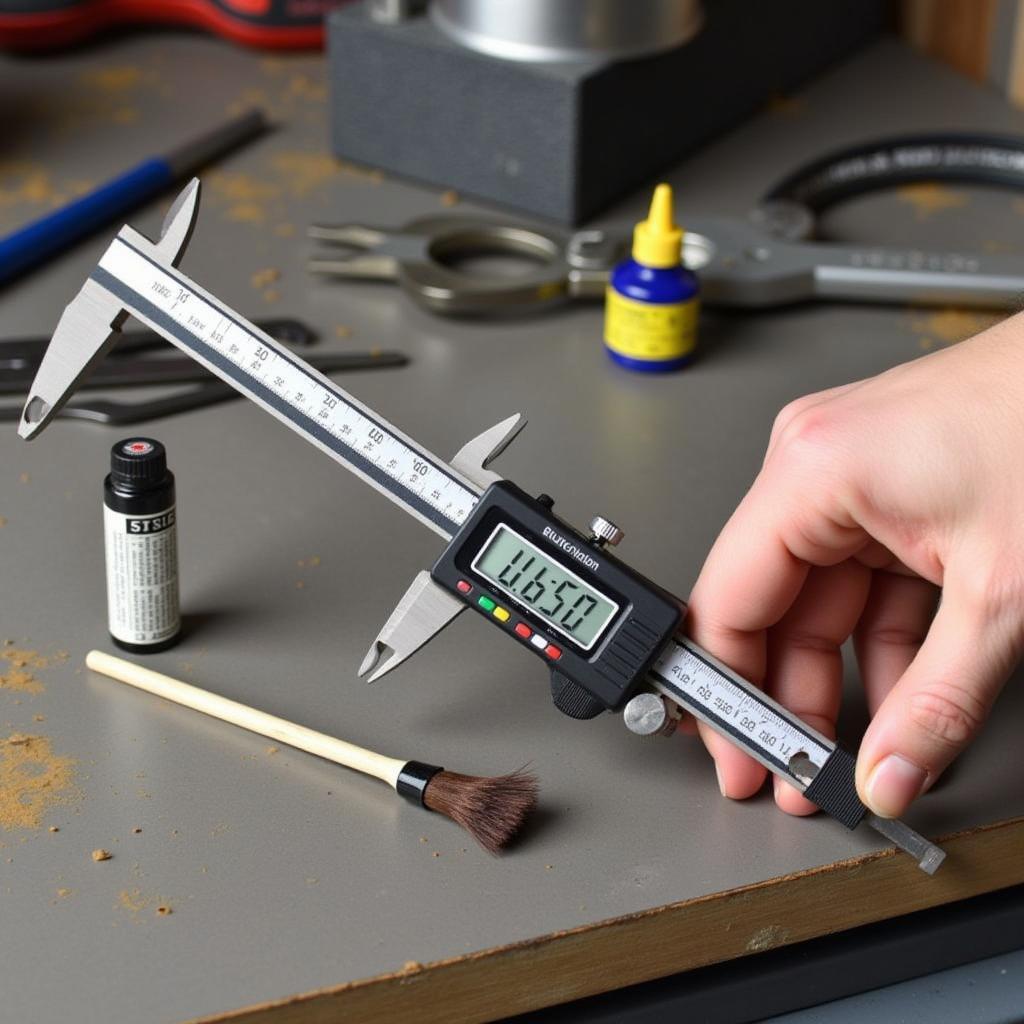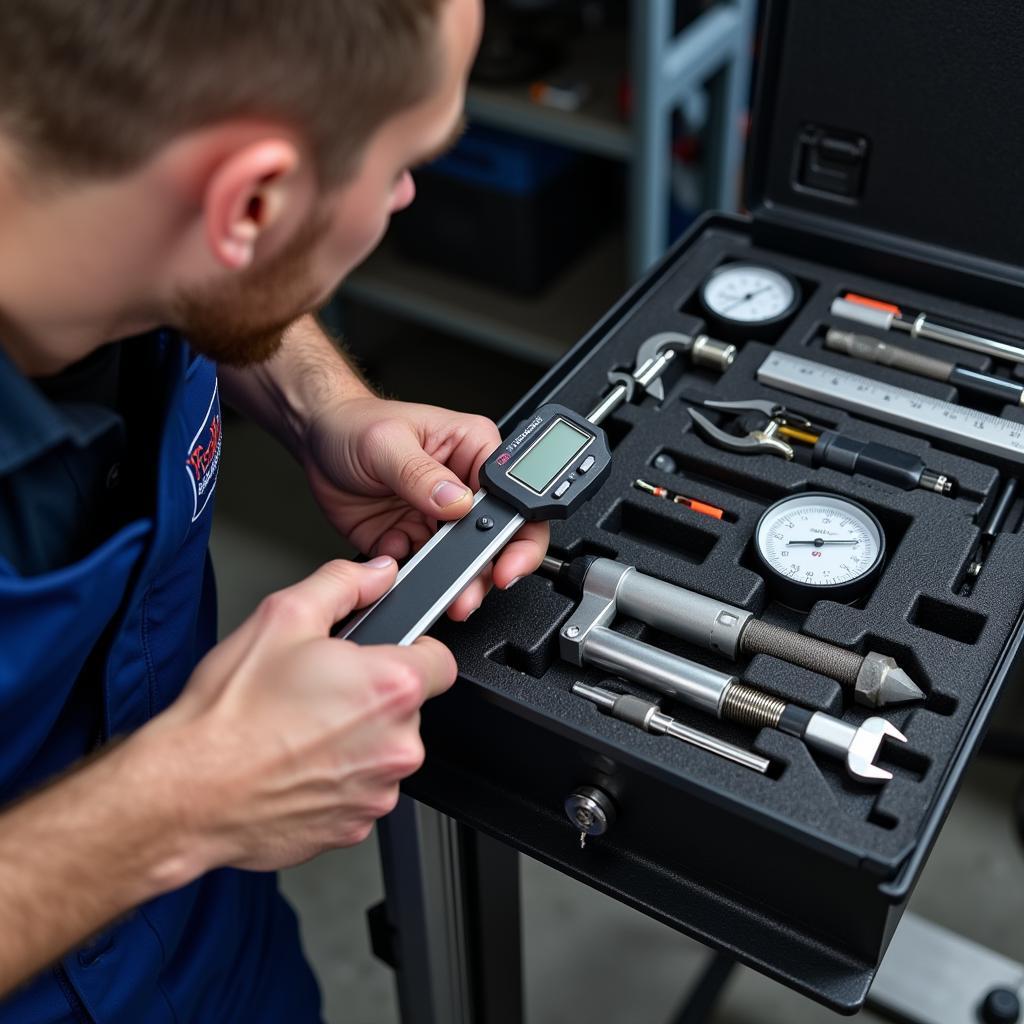Precision is paramount in any field, especially automotive diagnostics. Accurate measurements are the cornerstone of effective troubleshooting and repair. This relies heavily on the Care And Maintenance Of Measuring Tools, ensuring they remain accurate and reliable throughout their lifespan. Proper upkeep not only guarantees precise readings but also extends the life of your tools, saving you money in the long run. Learn the essential practices for keeping your automotive measuring tools in top condition.
Why is Care and Maintenance of Measuring Tools Crucial?
Maintaining the accuracy of your measuring tools is fundamental to successful car diagnostics. A faulty caliper or a miscalibrated torque wrench can lead to incorrect diagnoses and potentially damage a vehicle further. Think about it: a slight mismeasurement when gapping spark plugs can affect engine performance, and an inaccurate torque reading on a critical bolt can lead to component failure. Investing time in the care and maintenance of measuring tools is an investment in accuracy, efficiency, and ultimately, the longevity of your career as an automotive professional. These tools are extensions of your expertise, and keeping them in prime condition reflects your professionalism.
 Maintaining a Digital Caliper
Maintaining a Digital Caliper
Essential Practices for Measuring Tool Maintenance
Maintaining your tools isn’t just about wiping them down after use. A comprehensive approach requires attention to detail and adherence to best practices. Here’s a breakdown of essential steps:
- Cleaning: After each use, remove any dirt, grease, or debris from your tools. Use a soft cloth or brush and appropriate cleaning solutions. For delicate instruments, consider using specialized cleaning wipes or solutions.
- Storage: Proper storage is crucial. Keep your tools in a clean, dry environment, preferably in a designated toolbox or storage case. This protects them from moisture, dust, and impact. Consider using silica gel packets to absorb moisture in your toolbox.
- Calibration: Regular calibration is essential for maintaining accuracy. Refer to the manufacturer’s instructions for calibration procedures and frequency. For some tools, like torque wrenches, professional calibration services are recommended.
- Inspection: Regularly inspect your tools for signs of wear and tear. Look for cracks, chips, or damage to any moving parts. Address any issues promptly to prevent inaccurate measurements or further damage.
How to Clean Specific Measuring Tools
Different tools require different cleaning methods. For example, a simple wipe down with a clean cloth might suffice for a steel ruler, but a digital caliper might require a more delicate approach using a soft brush and specialized cleaning solution. Never submerge electronic measuring tools in water. tools used for car provides more insight on specific tool cleaning procedures.
Importance of Proper Storage
Storing your tools properly can significantly extend their life. A dedicated toolbox or storage case keeps them organized and protected. Remember to keep them away from extreme temperatures and humidity. Check out cars 3 tool box for some storage solutions.
Addressing Common Issues
Sometimes, despite proper care, issues can arise. A sticky caliper or a misaligned ruler can compromise accuracy. Understanding how to troubleshoot these common problems can save you time and money.
Dealing with a Sticky Caliper
If your caliper is sticking, it’s likely due to dirt or debris. Disassemble it carefully (if possible) and clean the sliding mechanism. Lubricate with a light oil or specialized caliper lubricant.
Fixing a Misaligned Ruler
If your ruler is bent or misaligned, it’s best to replace it. Attempting to straighten a metal ruler can weaken it and compromise its accuracy. For specific tool replacements, see car frame repairing tools.
“Regular calibration is non-negotiable for accuracy. It’s like getting your car’s alignment checked – crucial for optimal performance.” – John Miller, Lead Automotive Diagnostician
Choosing the Right Tools for the Job
Selecting the correct measuring tool for the task at hand is as important as maintaining them. Using the wrong tool can lead to inaccurate readings and potential damage. tools needed to replace a car compressor can guide you in selecting the right tools for specific tasks. Another helpful resource is on car rotor dimeter mesuring tool for those focusing on brake diagnostics.
 Choosing the Right Measuring Tool
Choosing the Right Measuring Tool
Conclusion
The care and maintenance of measuring tools is not just a good practice; it’s a necessity for any automotive professional. Implementing a regular maintenance routine ensures accurate measurements, prolongs tool life, and ultimately leads to more efficient diagnostics and repairs. By prioritizing the care of your tools, you invest in the quality of your work and your professional reputation.
FAQ
- How often should I calibrate my torque wrench?
- What type of lubricant should I use for my caliper?
- What’s the best way to store my measuring tools?
- How can I tell if my ruler is misaligned?
- What should I do if my digital caliper stops working?
- Where can I find calibration services for my automotive tools?
- What are the most common problems with measuring tools?
For any assistance, contact us via WhatsApp: +1(641)206-8880, Email: [email protected] or visit us at 910 Cedar Lane, Chicago, IL 60605, USA. We have a 24/7 customer support team.

Leave a Reply